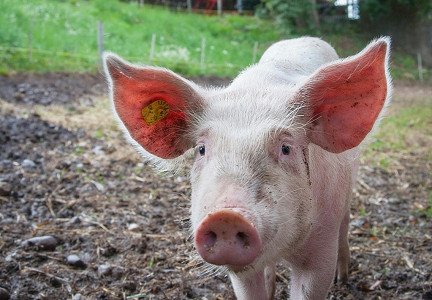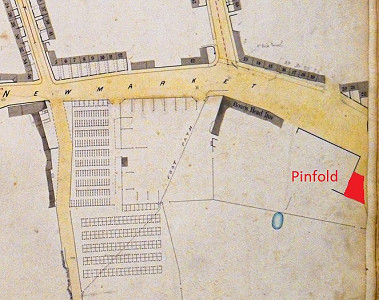Pinfolds

Pig

Louth's pinfold, shown in red
Pinfolds
A pinfold or pound is an enclosure for stray animals. In several places, such as Little Cawthorpe just south of Louth, there is a road called Pinfold Lane, which indicates the former location of the pinfold. In the early nineteenth century Louth’s pinfold was located on Newmarket, adhjacent to the Pig Market which is now the small Linden Walk car park. The what-3-words address of the Louth pinforld is pulse.froth.rungs. The walls of the pinfold were probably made of wood, and there are no remnants of it today.
Animals put in the pinfold were released only when the owner of the animals paid a fine. All types of farm animal were impounded – horses, cattle, sheep, goats, pigs and geese. This was because it was important that animals were not allowed to wander freely and eat crops.
Until enclosure in the late eighteenth or early nineteenth century, towns and villages had an open field system with few hedges or fences. Grazing animals had to be shepherded or tethered, systems which persist in many less developed countries today.
The pinder was the person whose job it was to put stray animals into the pinfold, and it was he who received the fines paid by the owners of the animals when they were released. The more animals that the pinder put in the pinfold, the higher his income, so he had an incentive to impound as many animals as possible. In the early nineteenth century, the Louth pinder was Michael Medley, a bricklayer by trade.
In August 1839, it was reported that in Louth Police Court Michael Medley, was charged by farmer Mr Bond with unlawfully impounding five of his pigs. Mr Bond’s servant girl stated she was driving them from the field into the town when they got a considerable distance in front of her, and Medley seeing no person with them, drove them into the pinfold. The girl immediately came up and remonstrated, but to no purpose. Mr Bond paid Medley the poundage, which the court subsequently ordered Medley to refund.
If you would like to find out more about pinfolds, have a look at the book “Lincolnshire pinfolds, pounds and pinders” by Marjorie Miller.